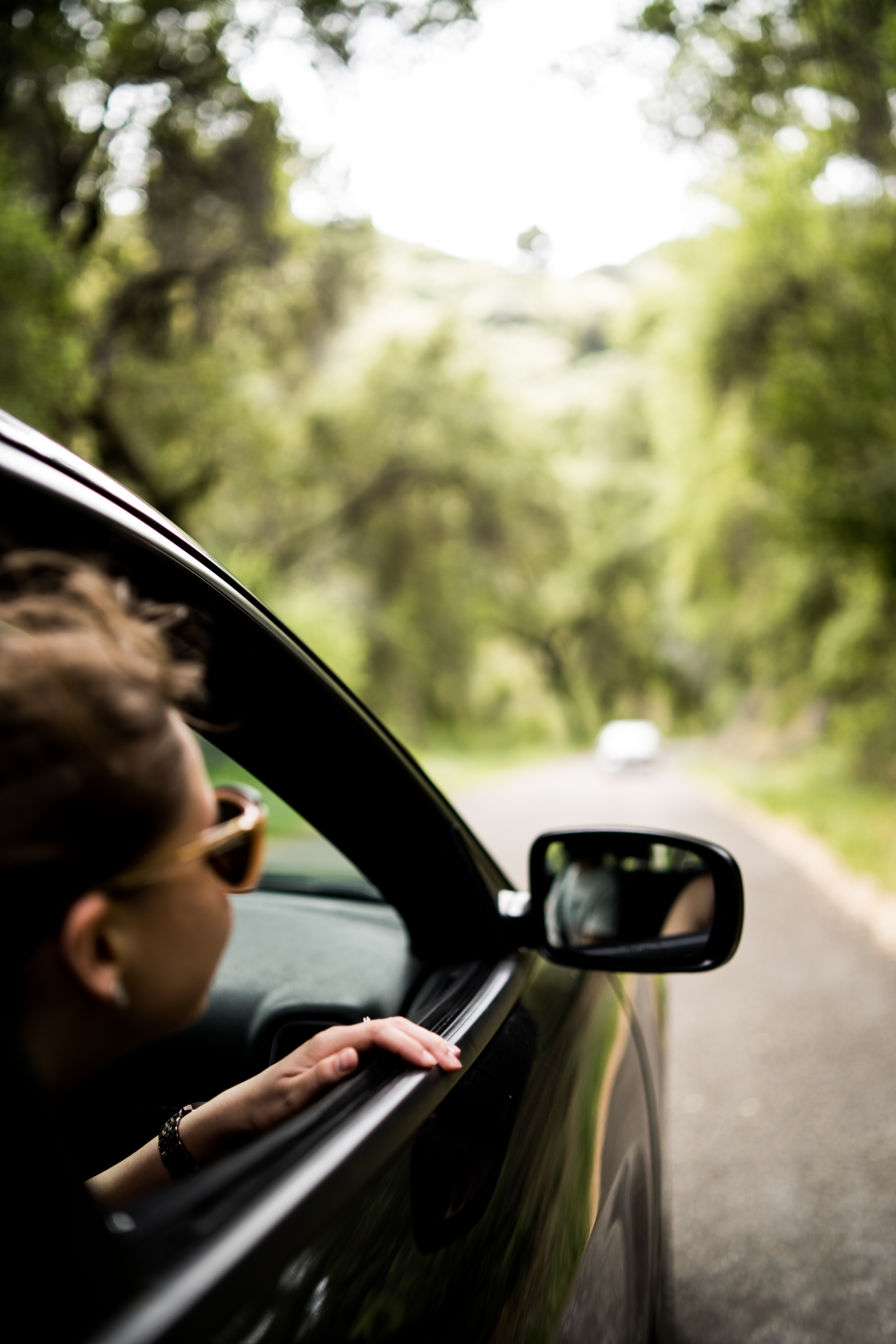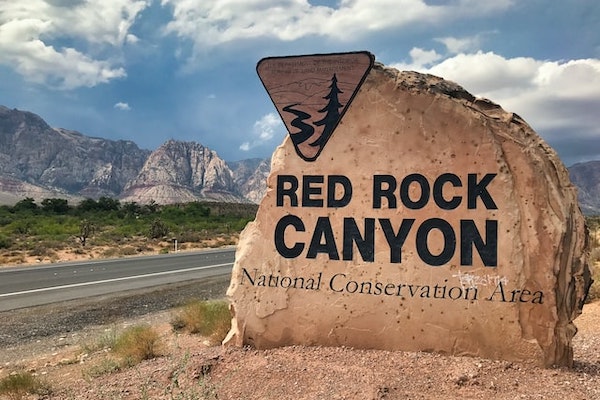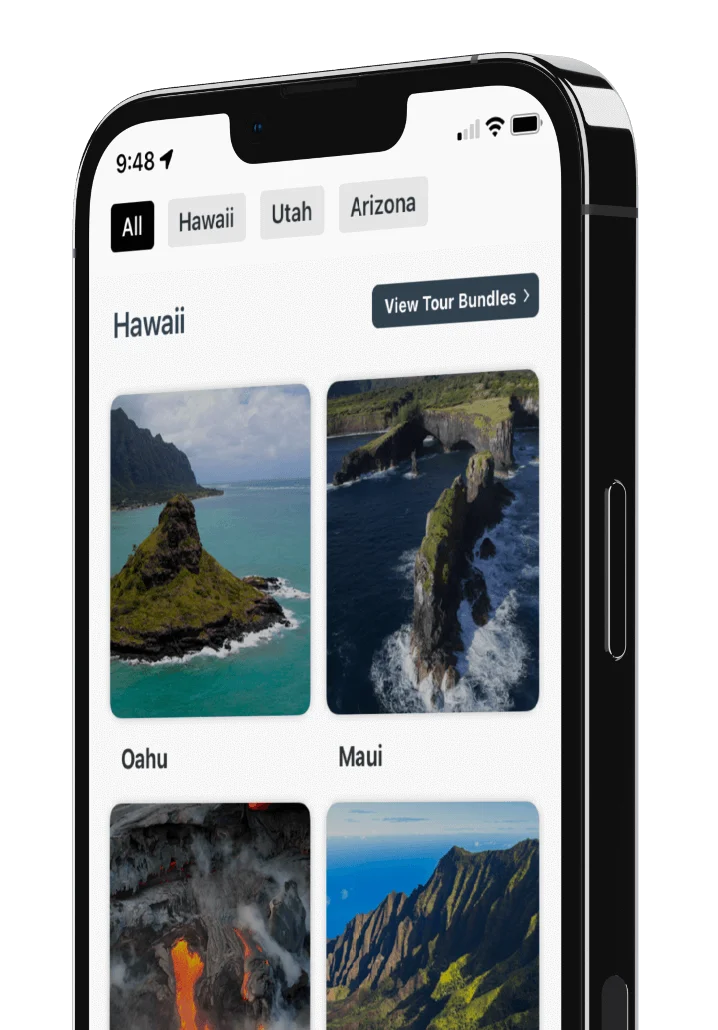
The Ultimate Hoover Dam Travel Guide

About Hoover Dam
Hoover Dam is located in Boulder City, Nevada, about 30 miles southeast of Las Vegas, and is the most-visited dam in the world. It spans the Nevada/Arizona border in the Black Canyon of the Colorado River. Hoover Dam created Lake Mead, which is the reservoir at the bottom of the dam.
Hoover Dam is 726.4 feet high and 1,244 feet long and is a testimony to our country’s conception and construction of such a monolithic project (after all, taming a river isn’t an easy task) especially since it was built during the Great Depression.
The dam was built in under five years in a barren and desolate land. In fact, it was so far from civilization that a whole settlement had to be created so that the workers and their families had a place to live while the construction workers went back and forth to the dam site. That town is named Boulder City, and it takes its designation as “the town that built Hoover Dam” very seriously. Everywhere you walk in the downtown historic district of Boulder City is an homage to Hoover Dam.
Hoover Dam stands as a national, historic landmark and world-renowned structure – named one of the Seven Modern Civil Engineering Wonders.
So why was Hoover Dam built? For several reasons, starting with the fact that the Colorado River was wreaking havoc on the land, causing catastrophic flooding. The river needed to be controlled, and its power used for good. With the west becoming more and more populated, demand for a stable, year-round water supply was increasing. And the dam would also serve as a source of hydroelectric power and help to irrigate farmland.
RELATED: Hoover Dam History: Why Was the Hoover Dam Built?
Information You’ll Need to Visit Hoover Dam
 Photo by Lizzie Gerecitano
Photo by Lizzie Gerecitano
Hoover Dam is run by the Bureau of Reclamation. Fun Fact: It doesn’t even have a physical address! Located in Boulder City, Nevada, there are several routes that’ll get you there. Just ask your GPS or any local from Las Vegas down on down to Boulder City. (we’re partial to the Shaka Guide tour route, ourselves!)
There are security checkpoints that you have to go through in order to get to Hoover Dam. You’ll drive through one in your car on the way there, and then you’ll walk through one (placing your stuff on a belt just like airport security) if you choose to go inside for the exhibits or a guided tour).
But Hoover Dam is free and open to the public, so you can park and walk around the entire site (which is mostly outside) including the rim, without ever paying for a guided tour or to see the exhibits.
Insider Tip: If you do want to see some great, interactive exhibits, check out the free Boulder City-Hoover Dam Museum in the historic district of Boulder City (with free parking in the plaza next to it). It’s inside the Boulder Dam Hotel and open from 7 am - 7 pm, 365 days a year. Just walk into the lobby and straight back, no fee or ticket necessary.
Parking
There is free parking available at Hoover Dam if you drive over the dam to the Arizona side and past the lots closest to the dam. This would require about a ¾ mile walk (or further, and uphill on the way back.) So, if it’s a hot day, you’d have to weigh the free parking option versus the $10 parking closest to the dam on the Arizona side, or the $10 parking garage on the Nevada side of the dam. (Motorhomes and other high-clearance vehicles must use the Arizona lots.)
Guided Tours of Hoover Dam
And if you do want to spend some money seeing Hoover Dam, it’s $10 for the Self Guided Visitor Center Tour (the exhibits), $15 for the Guided Powerplant Tour of the original construction tunnel and generators (plus exhibits), or $30 for the Guided Dam Tour of the tunnels and elevator to the top of the dam (plus exhibits.) Guided Dam Tour tickets cannot be purchased online. Dam Tour Tickets are sold on-site, in person, on a first-come, first -served basis, for ages 8 and up (Student, Military and Senior discounts with ID).
The hours of Hoover Dam are daily from 5 a.m. to 9 p.m. The tours run from 9 a.m. to 5 p.m. (The last tour departs at 3:45 pm and the doors to the Visitor Center exhibits close at 4:15 p.m.) No tours are offered on Thanksgiving or Christmas.
Getting to Hoover Dam
 Photo by Lizzie Gerecitano
Photo by Lizzie Gerecitano
One of the reasons Hoover Dam gets so many visitors is that it is very close to the tourist mecca of Las Vegas. From the city, it’s an easy, half hour to 45-minute drive southeast to Hoover Dam (depending on time of day, traffic and which route you choose to get there).
The closest airport to Hoover Dam is Harry Reid International Airport (formerly named McCarran International). This airport is situated in the heart of Las Vegas.
With Hoover Dam having created Lake Mead and sitting, literally, on top of it, no visit to Hoover Dam is complete without stopping by or driving down through the Lake Mead National Recreation Area afterwards for some hiking, scenic driving, overlooks, and to visit Boulder Beach – the shoreline of Lake Mead (which you’ll see from the rim of Hoover Dam.) Stop at the Lake Mead Visitor Center for maps and advice (or take the Shaka Guide tour which is full of great suggestions!)
RELATED: The Ultimate Lake Mead Travel Guide
If you have extra time during a trip to Las Vegas/Hoover Dam and would like to see another incredible place close to the city, you should head to Red Rock Canyon, which is less than a half hour west of Las Vegas. (Shaka Guide offers an incredible tour of Red Rock Canyon!)
If you’re also planning a trip to the Grand Canyon from Hoover Dam, here’s what you need to know:
- From the Hoover Dam to the West Rim of the Grand Canyon is just under a two hour drive. This location is actually on the grounds of the Hualapai Reservation. From there, you can walk 70-feet out over the glass Skywalk bridge for a clear view 4,000 feet straight down to the canyon floor. (And, fyi, the road that leads to the West Rim Skywalk is not covered by all rental car companies, so check the fine print of your rental car agreement.)
- From Hoover Dam to the more popular North or South Rims of the Grand Canyon is a much further drive – about five-and-a-half hours each way to either of those rims.
- From Hoover Dam to the East Rim of the Grand Canyon is a little under four hours’ drive.
RELATED: One-Day Itinerary: Red Rock Canyon
Hoover Dam (and Lake Mead) Weather & Best Time to Visit
 Lake Mead Visitor Cener / Photo by Lizzie Gerecitano
Lake Mead Visitor Cener / Photo by Lizzie Gerecitano
Since Hoover Dam is on Lake Mead, the weather is the same for both of these locations (perhaps sometimes slightly breezier when you’re walking along the top of Hoover Dam.) You can’t go wrong with the weather at any time of year, especially when it comes to sunshine. And winters are mild, compared to many other places in the U.S.
If you had to choose a season to come, then the best time of year to visit both Hoover Dam and Lake Mead is, decidedly, in Spring. It’s sunny yet not too hot, and therefore you’ll be comfortable hiking or walking around Lake Mead and Hoover Dam. If you’re in it for the swimming as opposed to walking or hiking, then you’d probably like the summer when the water’s warm (85 degrees, 29C) because a dip in Lake Mead is about the only thing that could cool you off from a sweltering 110 degrees (43C) day. Let’s break it down by season (below.)
But first, if you’re looking for the best time of year to visit Hoover Dam based on tourist levels, with Hoover Dam being such a major attraction, then the least crowded time of year is January and February. And the least crowded time of day is before 10 am, or after 3 pm.
Hoover Dam/Lake Mead in Spring:
This is the most popular time to visit. With warm, sunny days (plus the bonus of spring wildflowers) hiking is in full swing! The average high temperatures in April, May and June are 80 - 98 degrees Fahrenheit (27-37C). Nighttime lows are 50 - 66 degrees Fahrenheit (10-19C).
Hoover Dam/Lake Mead in Summer:
Record high temperatures define summertime here. So if it’s water activities you’re looking for with the picturesque mountains surrounding you, this is the time to come. Swimming, paddleboarding, kayaking, and boating are all popular in the summer. But you should not hike in this hot weather because it could be downright dangerous. In fact, some hiking trails are closed down completely for public safety. The average high temperatures in July, August and September are 89 - 103 degrees Fahrenheit (32-40C). The nighttime low averages 77 degrees Fahrenheit (25C).
Hoover Dam/Lake Mead in Fall:
This is another great season, and a very popular one for camping. The weather is warm and pleasant, and hiking season starts back up with many trails reopening until summer rolls around again. The average high temperatures in October, November and December are 59 - 83 degrees Fahrenheit (15-23C). Nighttime lows are 32 - 50 degrees Fahrenheit (0-10C)
Hoover Dam/Lake Mead in Winter:
Winter sunsets are simply spectacular here, and you’ll see the occasional snow capped mountain, too. So this is a popular season for photographers, bikers and campers. The average high temperatures are 57 - 69 degrees Fahrenheit (14-21C). Nighttime lows are 30 - 40 degrees Fahrenheit (-1-4C)
RELATED: When is the Best Time to Visit Hoover Dam & Lake Mead
What To Do In & Around Hoover Dam
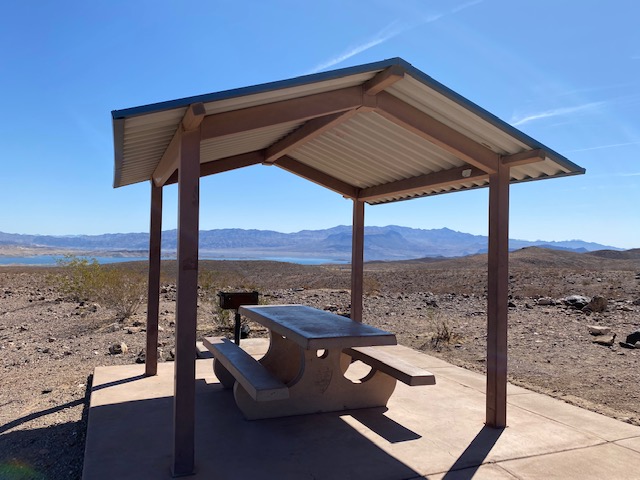 Longview Overlook / Photo by Lizzie Gerecitano
Longview Overlook / Photo by Lizzie Gerecitano
1. Shaka Guide Tour
There are so many places to see and things to do on a trip to Hoover Dam. Which is why Shaka Guide comes so highly recommended. The Shaka Guide Hoover Dam & Lake Mead Tour is chock full of stops, advice, and detailed information you might not ever find out about on your own.
2. Drive Across the Dam
At Hoover Dam, you should most definitely drive across the dam before parking, and up to the Hoover Dam Lookout on the Arizona side. Not only will this give you your best view of the dam (there is not an equal view from the Nevada side) but you’ll see where all of the free parking lots are located to help you decide where you want to park.
3. Be in Two Times Zones at Once
Once you do park, you can walk across the entire rim of Hoover dam on both sides. On one side, looking down, is Lake Mead. On the other side, looking down, is the Colorado River. Halfway across the rim is the state line, so you can stand with one foot in Nevada and one foot in Arizona, straddling two time zones (Mountain and Pacific)!
4. Guided Tours & Museums
You can also visit the cafe, gift shop, see all of the outdoor artwork, bronzes and plaques, and use the restrooms – free of charge. If you do want to pay, the information above has all of the details of the different ticket and guided tour options. But if you have stopped (or plan to stop) at the free Boulder-City Hoover Dam Museum, it’s arguably as good as the exhibits at Hoover Dam.
If you think you would enjoy taking an elevator down to see one of the original tunnels and the generators (some get claustrophobic), plus the ten-minute film about the building of Hoover Dam, then you might want to take the hour-long Hoover Dam Powerplant Tour.
5. Lake Mead National Recreation Area
On your way back from Hoover Dam, you’ll pass the entrance to Lake Mead National Recreation Area and Visitor Center. No trip to Hoover Dam is complete without a stop at this incredibly stunning park with scenic drives, overlooks, hiking trails, and Lake Mead itself – at the Boulder Beach shoreline. (It’s a big part of the Shaka Guide Tour.) If you’re not traveling during the heat of summer, the Historic Railroad Hike is a must.
6. Mike O’Callaghan-Pat Tillman Memorial Bridge
On your way back from Hoover Dam, you should take a little time to walk across the Mike O’Callaghan-Pat Tillman Memorial Bridge. It towers over Hoover Dam and gives you a remarkable view of the dam that you’d otherwise only get from a helicopter.
7. Boulder City
Either on your way to or from Hoover Dam, a visit to the historic district of Boulder City (the town that Hoover Dam is in) is a must, especially for the Boulder City-Hoover Dam Museum. This is such a sweet, little downtown that’s walkable and lined with restaurants, shops and hotels. Outside of the historic area, Hemenway Park is so picturesque that you’ll think you’re in a fairytale, and the bighorn sheep frequently come down off the mountain to graze the green grass in the late afternoon.
8. Red Rock Canyon
If you have an extra day to spare after seeing Hoover Dam and Lake Mead, Red Rock Canyon should top your list of other stupendous places to visit. Only about 25 minutes west of Las Vegas, it is a spectacular feast for your eyes. (Shaka Guide has a fantastic tour for that, too!)
9. Las Vegas
And, finally, let’s not forget Las Vegas – a destination in and of itself, and the place most people will fly into in order to see Hoover Dam. The options of things to do in Las Vegas are nearly endless and ever-changing, from gaming (for those 21+) to shows, fine dining to hotel experiences, museums (like the Mob Museum and Neon Museum) to iconic wedding chapels, and from the Fremont Street Experience to the Stratosphere observation deck (now called the Strat Skypod.)
Some other activities include:
Biking:
River Mountains Loop Trail
Bike Rentals: All Mountain in Boulder City
Hiking:
The Historic Railroad Trail
Owl Canyon, Northshore Summit & more
Swimming:
https://www.nps.gov/lake/planyourvisit/swimming.htm
Camping:
https://www.nps.gov/lake/planyourvisit/campgrounds.htm
Fishing:
https://www.nps.gov/lake/planyourvisit/fishing.htm
Guided Fishing Trips:
Captain Jack’s at Boulder Harbor Lake Mead
Lake Mead Riverboat Cruises/See Hoover Dam from the Water:
https://www.lakemeadcruises.com
Kayak Tours of Lake Mead:
Blazin’ Paddles, Boulder City
Stand-Up Paddleboard (SUP) Rentals for Lake Mead:
Paddle to the Core, Boulder City
Boat/Jet Ski Rentals for Lake Mead:
Boating Lake Mead at the Lake Mead Marina
Where To Stay Near Hoover Dam
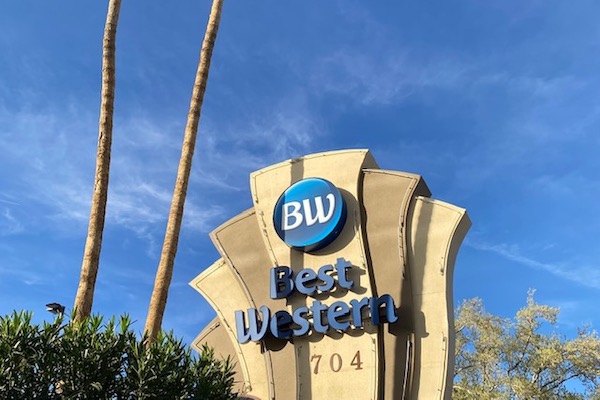 Best Western Hoover Dam / Photo by Lizzie Gerecitano
Best Western Hoover Dam / Photo by Lizzie Gerecitano
If you choose to stay closer to the Hoover Dam itself, and not in nearby Vegas, there are a few options for you:
- Best Western Hoover Dam: This is a great place in the heart of the Boulder City Historic District, with free parking and a pool. Reasonably priced. Leave your car there and stroll through this gorgeous little town’s shops and cafes. The hotel has a nice pub/restaurant on premises with outdoor seating, and ask about a voucher for breakfast across the street at the fabulous Southwest Diner!
- Boulder Dam Hotel: This is a gorgeous, classic and quaint hotel featuring the incredible Boulder City-Hoover Dam Museum in the lobby. Their outdoor patio is in the heart of the historic district, so you can walk to shops and restaurants. This hotel sells out, so advanced reservations are necessary.
- The Hoover Dam Lodge: This hotel is on the highway in Boulder City (instead of in the walkable, downtown historic district) and features a trail that leads down onto the Historic Railroad Hike in Lake Mead’s National Recreation Area.
How are the Water Levels at Hoover Dam/Lake Mead?
Due to a combination of climate change, years of drought conditions and expanding populations (and therefore a greater demand for water) in the area that Hoover Dam serves, Lake Mead has dropped below key thresholds in the past few years. As environmentalists continue to search for ways to refill the lake, our nation’s largest reservoir continues to drop in water level.
Lake Mead provides water to about 25-million people in Arizona, Nevada, California and parts of Mexico, and provides electricity to 1.3 million homes as well, in the form of hydroelectric power. But if Lake Mead water levels can’t be increased, the southwest will face unprecedented water cuts (starting with agriculture, then extending to municipalities) that will further reduce the amount of Colorado River water that can be used in cities.
The bottom line is that Hoover Dam, and the Glen Canyon Dam at Lake Powell (the dam above Hoover Dam) have been using more water than the Colorado river can provide. Effective changes must be made, or the Colorado River would eventually start to dry up and not be able to flow past Hoover Dam.
You can find out more of the details about this and many other geological and scientific facts about Lake Mead and Hoover Dam by downloading the Shaka Guide tour of Hoover Dam & Lake Mead. It does a really good job of explaining the challenges that enormous, man-made dams like this face.
Ready to visit this historic engineering wonder? Check out our Hoover Dam & Lake Mead Tour!
RELATED: Know Before You Go, Shaka Guide's Hoover Dam & Lake Mead Tour



